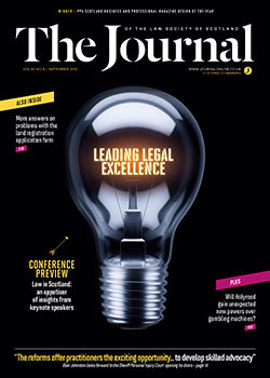How are we doing?

The risk management materials freely available on the Marsh website for Scottish solicitors at www.marsh.co.uk/scotlaw include self-assessment questionnaires, one of them focusing on some of the key areas of risk arising in property/conveyancing practice.
The aim is that firms, and individuals, consider using this questionnaire as a gap analysis tool, or as an aide-mémoire, to prompt review of:
- risk controls (processes, procedures, disciplines) already in place in the practice;
- risk controls which might be considered worthwhile introducing;
all with a view to reducing the risk of claims arising out of property/conveyancing practice.
The 2015 Master Policy Annual Report shows that there have been successive reductions in the number of Master Policy intimations over the most recent two insurance years. Even with the welcome reduction in frequency of intimations, property/conveyancing intimations continue to dominate the Master Policy claims experience (by number and value).
Lender claims/CML Handbook reporting failures
The level of borrower default during the economic downturn and losses on repossession incurred by lenders resulted in a large number of claims by lenders. From 2007-08, the largest component of lender claims related to allegations of non-compliance with certain CML Handbook reporting requirements in residential property transactions. Could property market/lending conditions result in history repeating itself? Have lessons been learned in relation to CML Handbook compliance?
Even if the view is taken that underlying risk factors are materially different in the current environment, the impact of exposure to a lender claim justifies taking steps to ensure that the CML Handbook reporting requirements are understood and are being addressed.
Compliance with CML Handbook reporting requirements [questionnaire excerpt]
What measures ensure that colleagues comply with all relevant CML Handbook reporting requirements?
[TICK ALL THAT APPLY]
- All colleagues maintain thorough knowledge of the CML Handbook requirements
- We use checklists
- We use the practice’s own
- workflow/case management software
- We use proprietary software
- Other (describe)
- Not applicable
Are all colleagues doing what is expected of them? Are they doing so consistently on all relevant files? Are corners being cut in some cases? Are new recruits following the agreed procedures? Could they be following a different approach? How is this checked?
What arrangements are in place to monitor colleagues’ compliance with CML Handbook reporting requirements?
[TICK ALL THAT APPLY]
- Active supervision of fee earners by e.g. team manager
- Random file audits/reviews
- A self-certification process for fee earners
- Use of software which includes checks and/or escalation and/or provides management information on compliance
- Other (describe)
- Not applicable
External frauds and scams – targeting property transactions
Exposure to frauds and scams is a significant risk concern for the profession. Addressing this remains a key risk target for the Society.
Although frauds and scams can affect any area of practice, there is evidence that fraudsters are targeting property transactions partly because of the sums involved. Fraud and scam risks are therefore of particular significance to property/conveyancing practitioners. Part of the response to frauds and scams is having in place effective risk controls, for example procedures and policies regarding, for instance, acting on payment instructions received by email. However, recognising that social engineering is a significant factor in exposure to frauds and scams, maintaining awareness of colleagues is an equally important aspect of firms’ management of the risk.
Exposure to external frauds and scams [questionnaire excerpt]
What measures ensure colleagues minimise risk of (the firm) being victim of an external fraud or scam? Example: Interception of emails – fraudster intercepts solicitor-client email exchange; sends email to solicitor pretending to be the client; provides bank details for transfer of free proceeds of sale/loan
[TICK ALL THAT APPLY]
- We have regular team/staff meetings and these matters are flagged
- We distribute guidance notes/bulletins/risk alerts
- Colleagues required to undertake Marsh training on Frauds & Scams
- Colleagues required to undertake Marsh training on Information Security
- Where bank details are provided by email, we verify by e.g. phone call
- All bank account/payment information sent by email is encrypted
- Other (describe)
Exposure to external frauds and scams [questionnaire excerpt]
How does the firm ensure colleagues are aware of current external fraud/scam risks?
[TICK ALL THAT APPLY]
- We have regular team/staff meetings at which these matters are flagged
- We issue bulletins to all relevant colleagues
- We require colleagues to undertake periodic assessment of awareness
- Other (describe)
- Not applicable
Other property/conveyancing claims experience:
The property/conveyancing self-assessment questions provide an indication of some of the other areas of risk in property/conveyancing transactions which have led to Master Policy claims in recent years.
Critical dates in property transactions [questionnaire excerpt]
Where the practice is responsible for flagging/ensuring compliance with critical dates, how is compliance monitored?
[TICK ALL THAT APPLY]
- By active supervision of fee earners by e.g. team manager
- We conduct random file audits/reviews
- We use software which includes checks and/or escalation and/or provides management information on compliance
- Other (describe)
- Not applicable
Attendance notes
Lack of attendance notes is often identified by insurers and panel solicitors as a significant handicap in presenting a successful defence on behalf of an insured practice in the event of a claim. In the absence of a file note, it is difficult for a practice to provide supporting evidence for its version of events, where the client has a contrary recollection. With a file note to support the solicitor’s recollection, the prospects of successfully defending the complaint or claim will be improved. How well is your firm doing?
Attendance notes [questionnaire excerpt]
Is there a note on file of all meetings and telephone conversations? yes / no
Do these notes record the client name, matter and matter reference and the date, time and participants? yes / no
Are the notes typed or, if handwritten, are they legible? yes / no
Do the notes prominently record any action points? yes / no
Do the notes prominently record any deadlines? yes / no
Are any significant decisions and instructions confirmed in writing? yes / no
Leases – break options
Last month’s article flagged that break options and service of break notices in relation to commercial leases continue to justify risk management focus. The claims experience reveals the list of points which require to be considered and addressed whenever instructed in relation to exercise of a break option.
Reference is made to an earlier article on the subject, “Breaking up is hard to do” (Journal, September 2009, 42) which encouraged solicitors to review their firms’ procedures in the light of the potential pitfalls identified in the article. Consider reviewing the article now and, using the headings in the article, assessing the effectiveness and consistency of your firm’s approach to drafting and service of break notices.
Future/periodic review
Consideration could be given to diarising and reviewing the questionnaire at intervals, treating it as an aide-mémoire to prompt consideration of the adequacy of your practice’s risk controls from time to time.
This reflects the fact that risk is dynamic – for example, exposure to external frauds and scams has grown relatively quickly to become one of the key risk concerns for solicitors.
Alistair Sim and Marsh
Alistair Sim is a former solicitor in private practice, who works in the FINPRO (Financial and Professional Risks) Practice at Marsh, global leader in insurance broking and risk management. To contact Alistair, please e-mail Alistair.j.sim@marsh.com
The information contained in this article provides only a general overview of subjects covered, is not intended to be taken as advice regarding any individual situation and should not be relied upon as such. Insureds should consult their insurance and legal advisers regarding specific coverage issues.
Marsh Ltd is authorised and regulated by the Financial Conduct Authority.
In this issue
- Good health – fair question?
- Time to raise the age of criminal responsibility
- Adoption of foreign children – a clash of cultures?
- Presumed liability: the case for action
- Le Bief Bovet: 700 years of litigation
- Reading for pleasure
- Opinion: James O'Reilly (fuller version)
- Opinion: James O'Reilly
- Book reviews
- Profile
- President's column
- Land Register completion update
- People on the move
- Conference calls
- A new court rises
- Questions of form
- Charities - why reserves matter
- Place your bets
- Pensions: a formula unravelled
- Whereabouts unknown?
- Lego Man keeps his mark
- The company one keeps
- Scottish Solicitors Discipline Tribunal
- Land, leases and LBTT
- Big budget brief
- Support sought as Napier joins the law clinics
- Public Guardian's fees to increase
- Law reform roundup
- TCPD: the Update way
- How are we doing?
- Thanks, but no thanks
- Ask Ash






